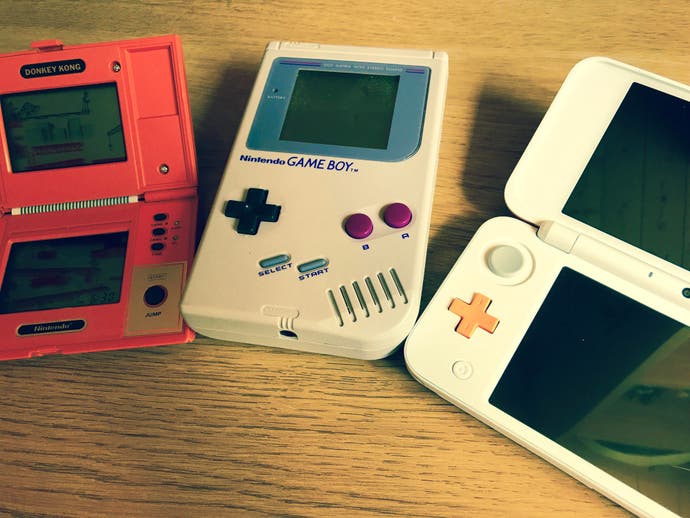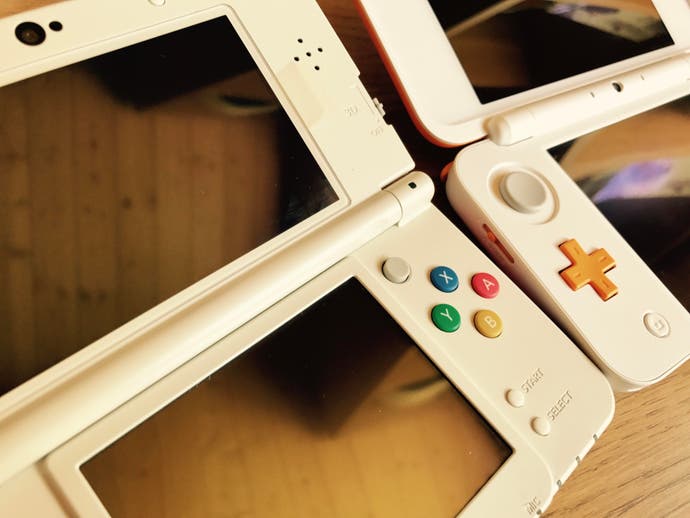Is the New 2DS XL Nintendo's last dedicated handheld?
Dealing the final hand.
It came and went with little fanfare. This Friday just gone, Nintendo released the New 2DS XL, a console that - barring any major surprises - will mark the end of an era you can trace back via some noted milestones to 1982, and to some of the Kyoto outfit's very first dalliances with video games. It could mark the end of several eras, in fact.
Nintendo's DS line has always been a fascinating mongrel that tossed together a handful of the company's various bloodlines, along with some of that lateral thinking that has often exemplified the company at its best. You can see the handheld heritage of the original 1989 Game Boy - a true phenomenon in its own time, yet still a console that was outsold comfortably by the DS itself - as well as that delightful and slightly inexplicable nod towards the multi-screen Game & Watch units popularised by 1982's Donkey Kong.
I've always loved how the DS wore Nintendo's history on its sleeve, though the machine's success came perhaps despite its curious set-up rather than because of it. When the machine was first revealed in 2004 it was universally mocked, and those astronomical sales would be some time coming.
It's fascinating to mull over what might have become of Nintendo's handheld line if it had stuck with the single-screen set-up it was pursuing in the wake of the Game Boy Advance, before the order came from up high that the new unit was to have two screens - a call made by Hiroshi Yamauchi that was apparently met with some disdain within Nintendo (and no doubt from outside as well - I've heard of developers working on the prototype known as Iris only being told at the 11th hour that the table was about to be well and truly flipped).
The DS was what Yamauchi wanted, though, and the DS was what we got. It was a novel creation, following the somewhat conservative Game Boy Advance, and the foundation for a new mass market era. Think back to the best DS games and there's a wealth of hard-edged cult classics - Bangai-O Spirits, The World Ends With You or Elite Beat Agents - but the most important titles were undoubtedly the ones that got the machine into the hands of generations both young and old that were new to games: Dr. Kawashima's Brain Training, Nintendogs or Professor Layton. With its touch-screen and eyes for a wider market, the DS ended up paving the way not just for the success of the Wii but the wider world of iOS gaming.

And mobile gaming would eventually do for it, too. The DS' successor, the 3DS, was far from a failure, but it nevertheless would end up playing second fiddle to smartphones for many. All of which perhaps shaped it into the fine machine it became, a dedicated gaming device that played host to a more serious breed of game, and one whose back catalogue is a parade of modern classics such as Fire Emblem Awakening, Kid Icarus Uprising or Monster Hunter 4. It's the success of the latter series which largely contributed to the enduring appeal of the 3DS in Japan, and the phenomenon that is Pokémon that's given it a stay of execution with this November's release of Ultra Sun and Moon.
Those games will help the 3DS go out in style, and while I don't think Nintendo's about to turn its back entirely on the machine's 67-million-strong audience, I don't think the future stretches out too much further, either. A dedicated handheld device just doesn't make any sense in this day and age, especially coming from a Japan in which mobile games dominate and even more dedicated players are comfortable playing something on their handset on their daily commute. This climate is hardly new - it's been over a decade since the iPhone came along and changed everything, after all - and Nintendo has, if anything, been slow to make the shift that was necessary for it to stay relevant.
Yet adapt it has, and rather well, too. Super Mario Run might have been a low-key debut when it comes to mobile gaming, but Fire Emblem Heroes - despite doubtless being the poorer game - has made a more lasting impact, while the success of the Switch seems to have taken even Nintendo by surprise, if those scant stock numbers are anything to go by. There's a decent balancing act there, in which Nintendo has managed to carve out its own space in the console market while slowly getting comfortable on mobile.
There has to be a casualty somewhere along the line, though, and I suspect that has to be the company's line of dedicated handheld hardware. Despite Nintendo's assertion that there is a future for its dedicated handhelds - let's not forget that similar overtures were made about the Game Boy line as the DS was introduced - there surely isn't the bandwidth to do anything more than quietly retire it all. You can tell from the relative lack of fanfare around the New 2DS XL's release that this is no longer at the frontline for Nintendo anymore.

Or, more accurately, you can tell how the dedicated handheld line has transitioned to a new audience. Hold the New 2DS XL in your hands, with its soft-to-the-touch curves and ridged case, and you can sense that this thing is explicitly, brilliantly, a toy. Nintendo's handhelds have never really hidden that side of their nature (Iwata once famously asserted to his engineers that the DS should be able to survive the fall from a child's bike basket) but there was a time when they also aimed for a certain respectability - think of the Apple-aping sleekness of the DSi, for example. This one, however, simply begs to be tossed across a messy living room floor.
There's no finer present for a younger player, really, especially given how the 2DS XL opens up an enviable back catalogue that stretches all the way back to the DS' original launch in 2004 (and if you're buying one for a friend or relative, be sure to bundle in Yoshi Touch & Go while you're at it - you can thank me later). The DS line has been home to a steady string of classics and curios, the hardware's set-up making sure they're all infused with a little eccentricity too. Who can forget stamping a book by shutting the clamshell in Zelda Spirit Tracks, or the brilliant graphic novel presentation of Hotel Dusk?
Part of me worries that, given the Switch's promise of home console games on the go, we'll lose some of that eccentricity as the DS bows out. The launch line-up for the New 2DS XL captured the traits of handheld gaming in a microcosm - the long overdue western release of Devilish Brain Training was a reminder of the DS' peak years, while Miitopia offers a sharp shot of the zaniness that's possible when Nintendo's working on a smaller canvas. Looking to the further reaches of my own library, meanwhile, there are treasures such as Kokuga, Attack of the Friday Monsters and Pocket Card Jockey. Do such games have a future anymore?
I'm not entirely sure, so I'm going to carry on cherishing them while I can. The Switch has shown that Nintendo's found the perfect middle ground between home and handheld and I've had one constantly by my side since it came out in March. But wherever I go, I always make sure there's room in my bag for that other handheld whose like we may well never see again.

